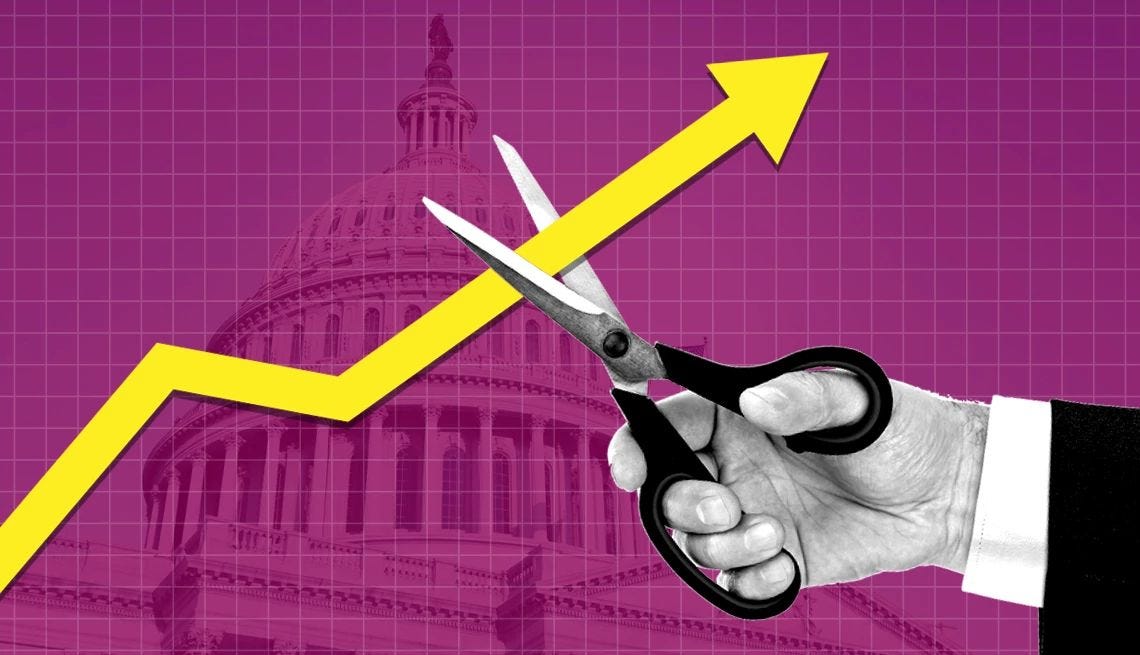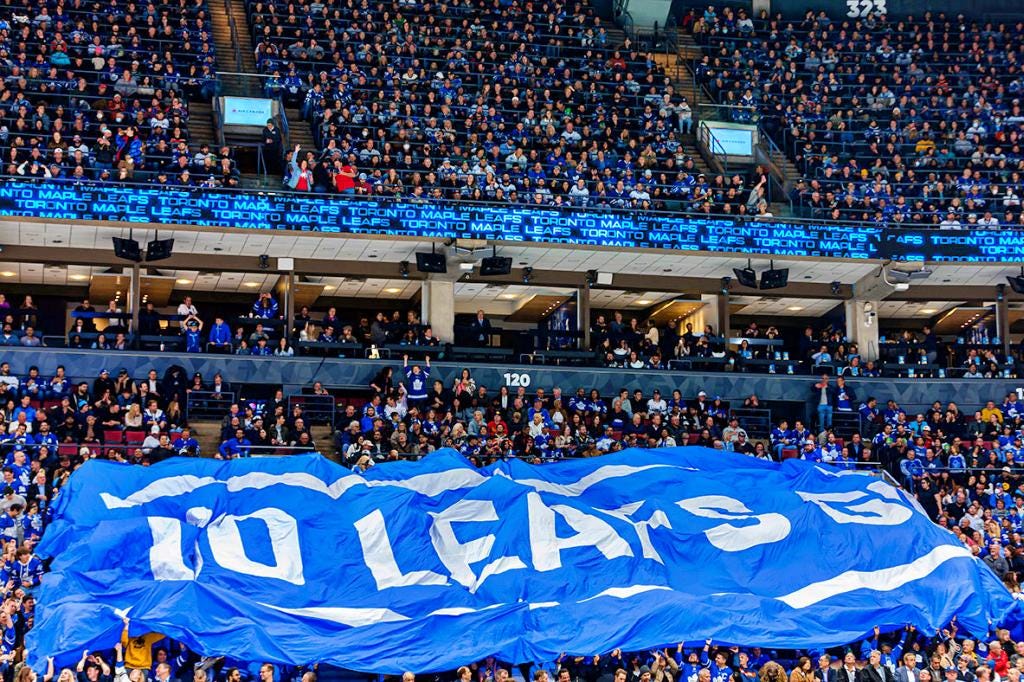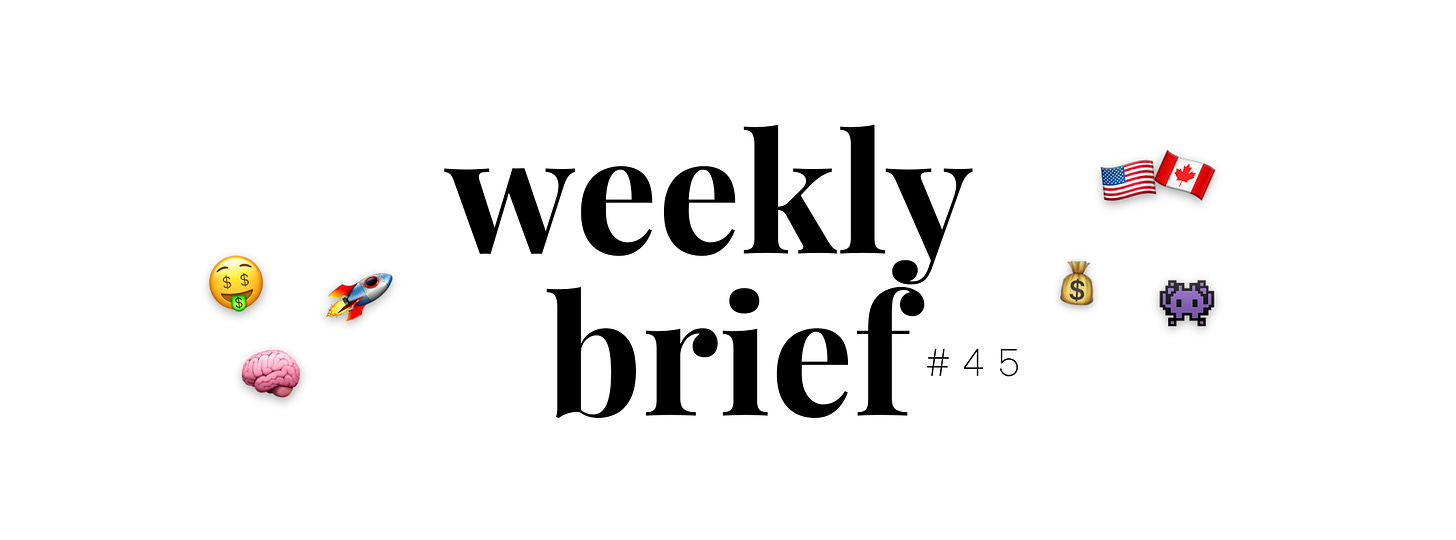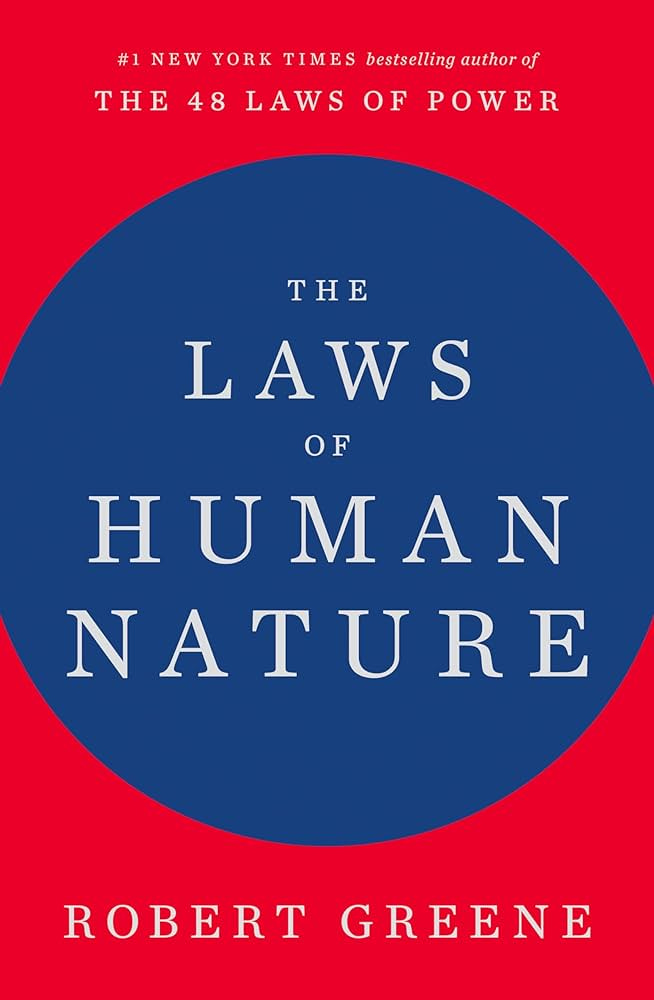Weekly Brief #45
The Fed cut rates, now what? Plus, Rogers acquires Bell’s stake in MLSE, TD launches Shopify competitor, Intel partners with Amazon AWS, Nike CEO steps down, Biden cracks down on Temu tax loophole.
Welcome to the 2 investors who joined us since the last Weekly Brief! If you’re reading on the web and haven’t subscribed, join 416 curiosity-driven, enthusiastic stock market-addicted mortals by subscribing here.
Good morning investors 👋,
Happy Friday and welcome or welcome back to the 45th Weekly Brief.
As we’ve been expecting since the meeting in August, the Federal Reserve cut rates this week. Not by 10, not by 20, and not even by 25 basis points, but by 50 basis points. Today’s featured story will focus on this rate cut, what it means for the stock market, and what to do next. Plus, Rogers acquires Bell’s stake in MLSE, TD announces Shopify competitor, Intel partners with Amazon Web Services, Nike CEO steps down, and more.
Let’s get into it.
In this issue:
✂️ The Fed cut rates, now what?
🤝 Rogers acquires Bell’s stake in MLSE
🇺🇸 Biden closes Temu/Shein tax loophole
FEATURED STORY

✂️ The Fed cut rates, now what?
Like we expected, the Federal Reserve cut rates this week, announcing a half-percentage point interest rate cut, reducing the key lending rate to a range of 4.75% to 5%. This marks the first time the Fed has cut rates since 2020, which is somehow over four years ago already. Fed Chairman Jerome Powell has said before that the decision to lower rates was due to a softer labour market, with recent expectations falling far below predictions. The most recent jobs report is a great example.
But what does this mean for our investments? What does this mean for the stock market as a whole?
Well, simply put, it means stocks will go up… in the short term.
Reasons include, but not limited to:
Cheaper Borrowing Costs: Lower rates make it cheaper for companies to borrow money to fuel growth, which leads to higher profits and, in turn, higher stock prices.
Increased Consumer Spending: Lower interest rates reduce borrowing costs for consumers (i.e., mortgages, loans), which can increase consumer spending. Higher consumer spending = higher revenue = higher stock prices.
Attractiveness of Stocks/Lower Discount: When interest rates are low, the risk-free rate or bond yield offers lower returns. When investors can’t get a meaningful return at low risk, they turn to the stock market, increasing demand and leading to, you guessed it, higher stock prices. As of the time of writing, there is over US$2 trillion worth of idle cash sitting in bonds, GICs, and savings accounts that could potentially enter the market as rates in risk-free alternatives drop. Something to note, is that when investors seek returns in a low-rate environment, since they can no longer get good low-risk returns, they expose themselves to more risk, thereby valuing stocks using a lower discount rate or required rate of return. (Meaning, less dollars earned for every dollar invested).
Higher risk = higher valuations = higher stock prices.
In the short term, these reasons by themselves can help fuel growth in stock prices. It’s why right after this announcement, U.S. markets alone rose nearly 2%. Over the long term though, if always exposed to low borrowing and taking on high risk, the stock market could form an egregious valuation, potentially leading to a bubble and a market crash. This is the extreme scenario, but not far fetched.
What to do next
Keep investing. Following and trying to invest based on macroeconomic factors is a game of roulette. Most of the time, you’re going to be wrong, but those who are right some of the time preach about how they will be right the next time. When in doubt, remember that TD Bank predicted a recession by June 2024 back in November 2023. I’m writing this in September 2024, and there have been no announcements or signs of a recession so far.
Eventually, though, there will most definitely be a recession. When that happens, consumers spend less, stocks fall, unemployment rises, rates are slashed to stimulate the economy, and it stays that way on average for about a year. When a recession happens, that’s when you should be renewing your mortgages, that’s when you should be buying a car, or adding to your stock portfolio. There are exceptions to every rule of course, like fixed-rate mortages and such, but generally this is the financially mature way to go about life. When others are scared, when others are not spending money or are selling off their stock portfolio, chances are, it’s a good time to do the exact opposite.
“Be fearful when others are greedy and greedy when others are fearful.” — Warren Buffett
In all things, preparation is key. There’s no way to predict what can happen, but there’s always a chance it will1. Keep some cash aside, but also keep investing when possible. Because as the economy recovers, you’ll be glad you got those amazing rates or those stocks at cheap prices.
It’s inevitable that the economy will go into recession every so often; however, the economy in 10 years is likely to be stronger than it is today, that’s also inevitable. Stocks will be higher, more people will have jobs, and the global economy will continue to grow over the long term.
In short, this rate cut is good news. It’s good for the market in the short term, and it benefits everyone indirectly and directly in the short term. As for what to do next… just be prepared. If you’re investing (as you should), saving some cash, and not anticipating or expecting a downturn, but being ready if it were to happen, then you’ll be fine. That’s all there is to it, and it’s what I’m currently doing.2
FINANCE

a. 🤝 Rogers acquires Bell’s stake in MLSE
This week, Rogers Communications announced it will be buying Bell’s 37.5% stake in Maple Leaf Sports & Entertainment (MLSE), the company that owns the Toronto Maple Leafs, Raptors, Marlies, and Argonauts, for $4.7 billion. The deal is expected to close in mid-2025, and according to Bell, it will help reduce debt and steer Bell’s focus on becoming a tech company.
Since the original partnership of investing in MLSE was divided evenly in ownership between Rogers and Bell, Rogers will now hold a 75% majority ownership of MLSE after this acquisition. However, Bell will retain content rights for half of the Leafs’ and Raptors’ regional games. MLSE Chair Larry Tanenbaum holds a 20% stake, while the remaining 5% is owned by the pension fund Ontario Municipal Employees Retirement System.
b. 👟 Nike CEO steps down
In a sudden turn of events, after looming questions surrounding leadership, Nike has officially announced that CEO John Donahoe will step down. Elliott Hill, a company veteran, will be returning from retirement to take over. Donahoe has led the company since 2020 and will end his leadership on October 13.
Under Donahoe, who was a tech executive for most of his career, Nike faced challenges with declining sales and a shift to direct-to-consumer sales, which weakened decade-long relationships with retailers, leading to increased competition and loss of shelf dominance. Hill hopes to fix all of this for once and for all. Shares rose 8% after the news.
BUSINESS

c. 🍪 Intel to make AI chips for Amazon
After receiving up to $3 billion in funding from the U.S. CHIPS Act, Intel’s foundry business has just secured a multibillion-dollar, multi-year contract with Amazon to produce custom AI chips for Amazon Web Services (AWS), the largest cloud computing company on Earth.
AWS will use Intel’s advanced 18A chip process for an “AI fabric chip,” with future designs on the 18AP and 14A processes. The deal is part of Intel CEO Pat Gelsinger’s turnaround plan, which includes cost cuts, selling a stake in Altera, and pausing European projects.
d. 🛍️ TD announces Shopify competitor
Toronto-Dominion Bank (TD) has now launched an e-commerce platform to help small businesses build their online presence, entering into the space predominantly controlled by Shopify. This new offering marks the first-ever for a Canadian bank, stemming from a partnership with BigCommerce expanding TD’s payment processing services.
As tech companies like Shopify and Square leverage their dominace to enter the financial services industry, this move by TD is a way to leverage its financial dominate to enter the tech industry. “While Shopify has established itself as a global leader, TD’s entry could potentially reshape the landscape for small business e-commerce.” — Retail Insider
POLITICS
e. 🇺🇸 Biden cracks down on Temu tax loophole
The Biden administration is now looking to target low-cost products coming from China, from places like Temu and Shein, by implementing a new rule to close a loophole that currently allows foreign companies to bypass tariffs by shipping goods valued at $800 or less.
Many Chinese sellers have used this exemption to flood the U.S. market with cheap items. The White House says this loophole has led to over 1 billion small package shipments every year, raising concerns about unsafe imports… (and you’re not going to believe this one)… one being fentanyl. The rule is set for public comment before being finalized.
📚 Book of the Week
Note: I don’t recommend books that I haven’t read or that I would never read. The books I recommend are books I have already read or that I will eventually read.
The Laws of Human Nature — Robert Greene
Book Description:
Robert Greene is a master guide for millions of readers, distilling ancient wisdom and philosophy into essential texts for seekers of power, understanding and mastery. Now he turns to the most important subject of all — understanding people’s drives and motivations, even when they are unconscious of them themselves.
We are social animals. Our very lives depend on our relationships with people. Knowing why people do what they do is the most important tool we can possess, without which our other talents can only take us so far. Drawing from the ideas and examples of Pericles, Queen Elizabeth I, Martin Luther King Jr, and many others, Greene teaches us how to detach ourselves from our own emotions and master self-control, how to develop the empathy that leads to insight, how to look behind people’s masks, and how to resist conformity to develop your singular sense of purpose. Whether at work, in relationships, or in shaping the world around you, The Laws of Human Nature offers brilliant tactics for success, self-improvement, and self-defense.
✩ This newsletter, along with my weekly Morningstar fair value estimates and PDFs, will always be free of charge. Your support, whether through a donation or by reading this newsletter and following along, is greatly appreciated.
Thank you for reading today’s Weekly Brief! If you enjoyed or learned anything, please spread the word. (Remember, none of this is financial advice, please do your own research.)
— Jacob
Murphy’s Law undertone.
None of this is financial advice.






